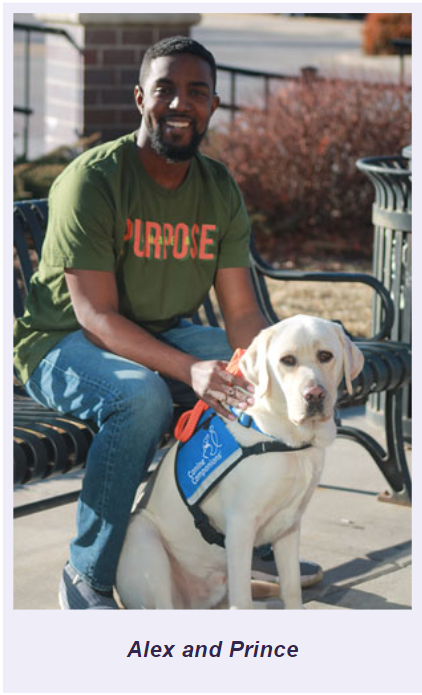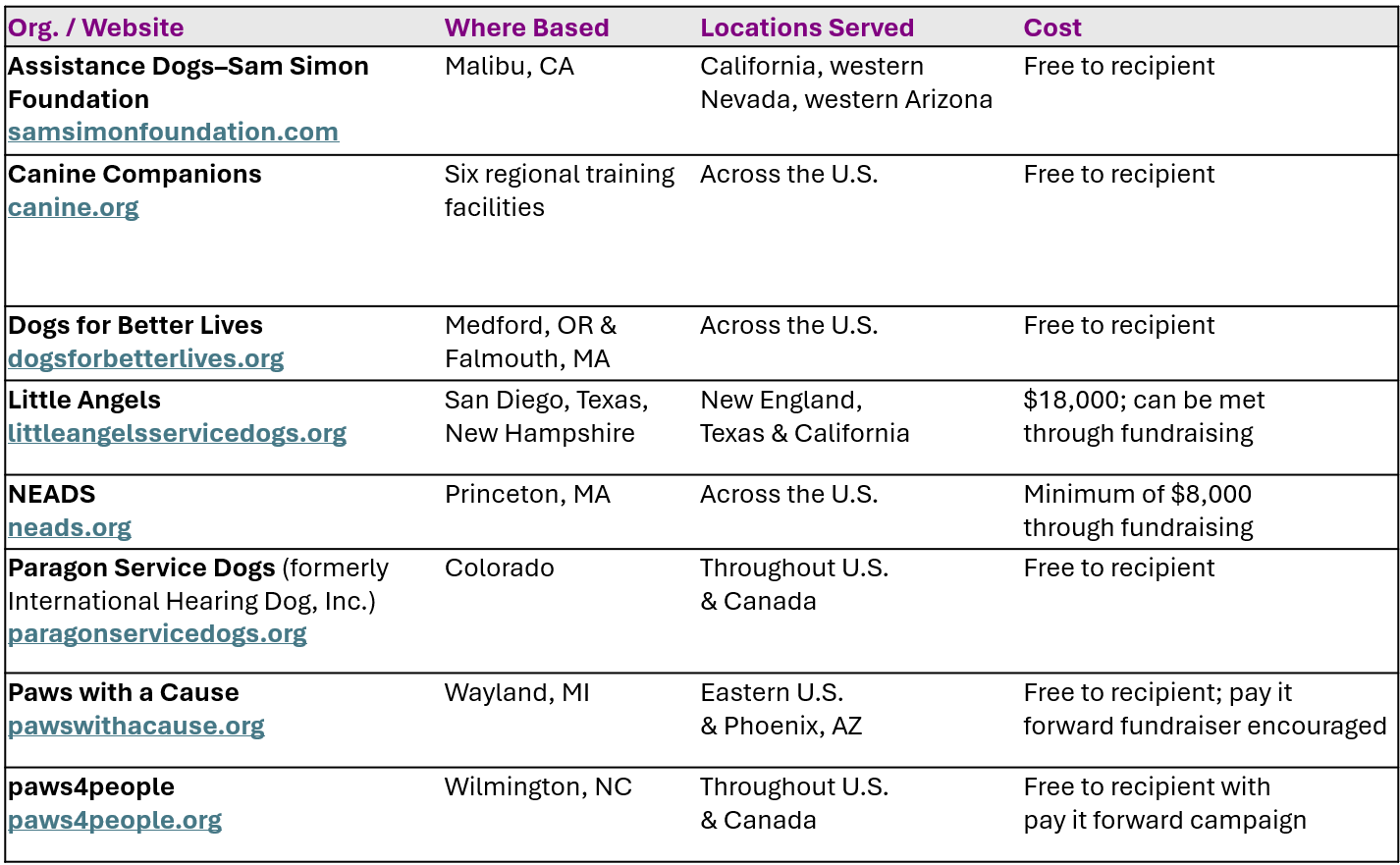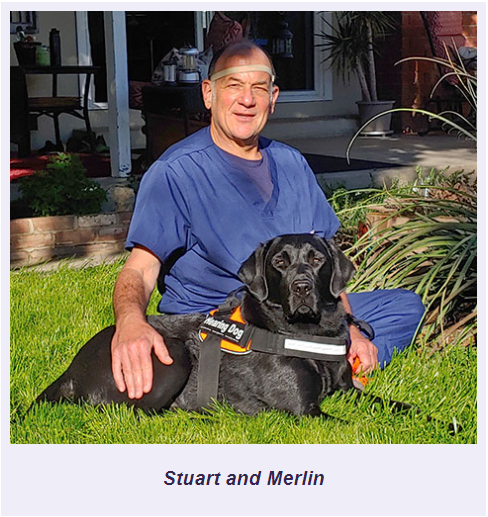 “My life used to be like the first part of The Wizard of Oz movie, very sedentary and gray,” says Amy, a young bilateral cochlear implant recipient. “Since Mindy, my world has exploded in Technicolor!”
“My life used to be like the first part of The Wizard of Oz movie, very sedentary and gray,” says Amy, a young bilateral cochlear implant recipient. “Since Mindy, my world has exploded in Technicolor!”
Mindy is Amy’s certified hearing assistance dog, who was trained by Dogs for Better Lives, a service animal training nonprofit with facilities in Medford, Oregon and Falmouth, Massachusetts.
“As my ‘second half,’ she makes me so much more aware of the world around me. All I need is to see her ears twitch to know if there’s something that requires a reaction. With Mindy by my side, I have the confidence to go out and enjoy life.”
The modern use of dogs to assist individuals with disabilities dates to World War I, when guide dogs were trained to support visually impaired veterans. Over time, service dog functions expanded to assist people with various disabilities, including those who are deaf or hard of hearing. Specially trained hearing assistance dogs were first introduced in the United States in the late 1970s to enhance independence by providing essential auditory alerts as well as emotional support and companionship.
Today, a range of programs around the U.S. specialize in training and placing hearing assistance dogs with individuals in need—many at no cost to the recipient. This article highlights three organizations and provides additional resources you can visit for more information if you are considering the possibility of getting a hearing dog.
 When Alex, an accomplished young baseball player with hearing loss, felt increased anxiety about missing important sounds and communications, he started withdrawing from activities and staying home, where everything was safe and familiar. His concerned family reached out to a regional office of Canine Companions and service dog Prince soon came into Alex’s life.
When Alex, an accomplished young baseball player with hearing loss, felt increased anxiety about missing important sounds and communications, he started withdrawing from activities and staying home, where everything was safe and familiar. His concerned family reached out to a regional office of Canine Companions and service dog Prince soon came into Alex’s life.
With Prince there to alert him to visitors at the door, a beeping alarm clock, friends calling his name and other sounds, Alex became more relaxed and regained his outgoing personality.
“The level of confidence and reassurance I feel with Prince is so impactful,” he says. Today, Alex is focused on coaching and encouraging other young athletes on the diamond.
If you, or a family member, are interested in obtaining a trained hearing assistance dog, start by learning about specific issues related to service animals, such as Americans with Disabilities Act (ADA) laws, where they are allowed, and more from the ADA National Network Service Animal Resource Hub. This can help you decide if a hearing dog is the right option for your specific needs and lifestyle.
If you choose to move forward, continue your research about various programs to find one that best fits your needs. Visit Assistance Dogs International for a comprehensive, searchable database of accredited service dog organizations. Each has different eligibility criteria, locations served, training procedures, dog breeds, waiting periods, etc. You should also decide if you require a Home Hearing Dog or a Certified Hearing Dog that is trained to support its partner in public environments.
As an alternative, some people choose to train their own service dogs, as described in this recent Healthy Hearing article, typically with the support of an organization such as Atlas Assistance Dogs.
Here are a few suggested questions to consider as part of your decision-making process:
The table below has basic information to get you started; visit each organization’s website for more details. Most provide hearing and other service dogs at no cost to the client, although some require a financial commitment that can be met through fundraising. Please note that this is not a comprehensive list; there may be additional organizations serving your area, and some information may have changed.

 For most of his life, Stuart managed to get by with his progressive bilateral otosclerosis—until he couldn’t hear at all anymore, following several unsuccessful surgical attempts. After he inadvertently locked his wife out of the house for hours, and couldn’t hear her pounding on the door or calling on the phone, they started the search for a hearing support dog.
For most of his life, Stuart managed to get by with his progressive bilateral otosclerosis—until he couldn’t hear at all anymore, following several unsuccessful surgical attempts. After he inadvertently locked his wife out of the house for hours, and couldn’t hear her pounding on the door or calling on the phone, they started the search for a hearing support dog.
The southern California couple was delighted to discover The Sam Simon Foundation Assistance Dogs nearby in Malibu and soon three-year-old Merlin, a black Labrador retriever, joined their home and Stuart’s daily life.
“Merlin is a great comfort to me as my hearing loss has become profound,” Stuart shares. “He is basically an extension of me, acting as my ears. Prior to Merlin’s arrival, I was very isolated, and the difference in my life with him is huge. Now he is part of my family and I love him.”
About the Hearing Loss Association of America
The Hearing Loss Association of America (HLAA) is the leading voice of the growing number of people with hearing loss in the U.S. We advocate to increase access to care and treatment, break down stigmas through education and awareness, and empower people with hearing loss through a nationwide network of support. Our work impacts millions, improving the lives of people with hearing loss, and elevating the importance of hearing health and accessible communication, through national legislation and public policy, and a network of chapters and state organizations. HLAA's Walk4Hearing events raise awareness and funds in cities across the country and bring hope to individuals and families dealing with hearing loss. Visit hearingloss.org for more information.